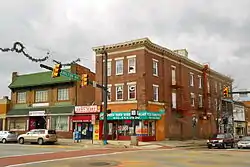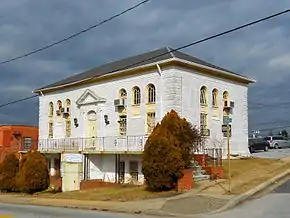Hamilton, Baltimore
Hamilton is a mixed density urban neighborhood located in northeastern Baltimore City, Maryland.
Hamilton | |
|---|---|
 Corner of Hamilton Avenue and Harford Road | |
| Country | United States |
| State | Maryland |
| City | Baltimore |
| Population (2010) | |
| • Total | 20,564[1] |
| Time zone | UTC-5 (Eastern) |
| • Summer (DST) | EDT |
| ZIP code | 21214[1] |
| Area code | 410, 443, and 667 |
History
The neighborhood was originally farmland along the Harford Road corridor, which at the time was a major arterial route out of Baltimore City into the much more rural Harford County. Prior to its annexation into Baltimore City in 1918, Hamilton was part of Baltimore County and had its own volunteer fire department.[2] The neighborhood began to be developed in the late 1910s and early 1920s and, for some areas, into the 1950s. Architecturally, most of the homes are similar to each other, and are larger, 1920s- and 1930s-era houses, with broad front porches and rather spacious yards, analogous to the larger suburban homes of today. Although, there are small pockets of the famous brick-faced Baltimore rowhouses scattered throughout the neighborhood, especially along Harford Road south of Echodale Avenue.
_VFD.jpg.webp)

Generally speaking, Hamilton evolved into a mixed-race middle class throughout the 1970s and 1980s, with pockets of a bit more wealth within. With the shuttering of the Arcade Theater in the early 1980s, a large, community-oriented plaza and movie house was suddenly vacant, and urban blight began to creep into the commercial and cultural nexus of Hamilton, which runs from approximately Harford Road. and Echodale Avenue up to the intersection of Harford and Old Harford Roads.
Beginning in the early 2000s, the Harford road corridor has seen increased urban development with award-winning restaurants including Clementine, Big Bad Wolf's House of Barbeque, the Hamilton tavern, and Los Amigos. Towards the end of 2000 other businesses and professionals began to move into the neighborhood including the eminent physical therapist, Sumesh Thomas, who started Hamilton Physical Therapy.
Two art galleries and the Hamilton Arts Collective can also be found along the stretch of Harford road that runs through Hamilton. The neighborhoods of Hamilton and Lauraville have both gained Mainstreet grants to support beautification and small business development along the Harford Rd. corridor. This neighborhood is a culturally diverse area that has a strong sense of inclusion and community involvement.
Geography
The boundaries of Hamilton, like many urban neighborhoods are rather amorphous and hard to define, but is generally thought to include everything between Perring Parkway in the west, and across to Walther Avenue in the east, with Southern Avenue forming, fittingly, the southern boundary and Northern Parkway forming the northern boundary. The land is for the most part gently rolling hills, with some surprisingly steep sections for Baltimore City (for instance, Bayonne Avenue, east of Harford Road.) Herring Run flows through the western edge of the neighborhood, and its immediate watershed is an urban greenspace which comprises Herring Run Park.
(Note: Echodale is the northern boundary of Lauraville. Hamilton was once called Northern Lauraville, but has taken on a name of its own. However, Lauraville runs from Argonne Drive to the south to Echodale Ave to the north.)
See also
- List of Maryland state highways
- Old Harford Road
- Parkville, Maryland
References
- "21214 Zip Code Detailed Profile". City-data.com. Retrieved January 28, 2015.
- Kelly, Jacques (1986). Baltimore Neighborhoods in Focus. Baltimore, Md.: Enoch Pratt Free Library. p. 145. ISBN 0-910556-23-7.